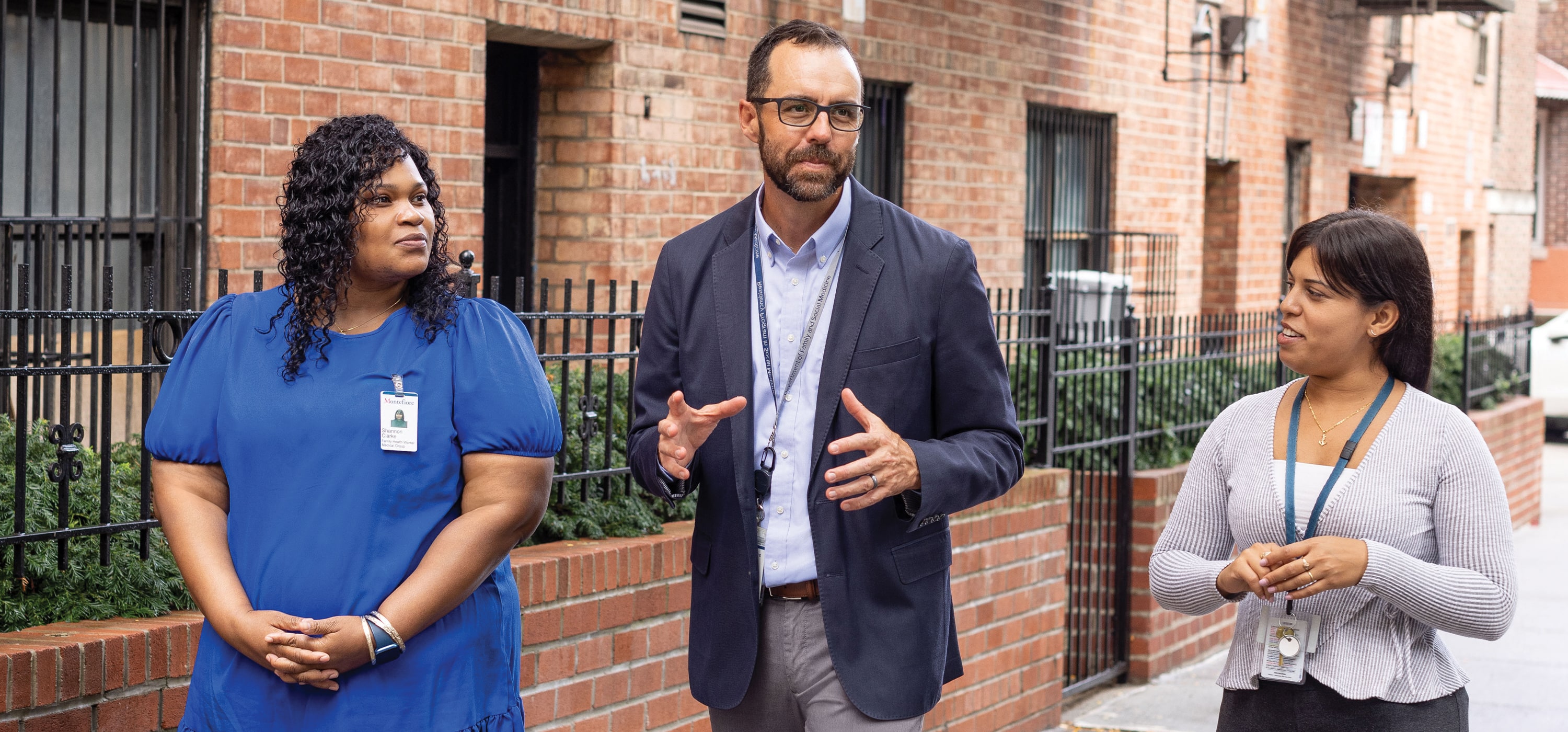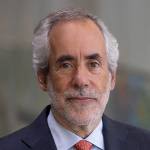
Damaris Flores, a community health worker (CHW) at Montefiore, is at the forefront of innovation in primary healthcare. Ms. Flores, who was born at Montefiore and lives in the Bronx, was among the first people to become part of the Community Health Worker Institute (CHWI) at Montefiore.
Established in 2021, CHWI recruits and trains local residents to connect with patients and help them access a wide range of available resources. It’s a relatively new role in this country—the national census listed CHW as an occupation for the first time in 2010—but for more than a century, people like Ms. Flores have been a vital part of health systems in other nations.
“At the institute we’re focusing on community health workers as a way to bridge the huge gap in our health system between clinical care and social services,” says CHWI’s director, Kevin Fiori, M.D., M.P.H., M.S., associate professor of pediatrics and of family and social medicine at Einstein and director of social determinants of health in the office of community and population health at Montefiore. “They bring a tremendous amount of local expertise that we don’t always have on the clinical team.”
In the United States, health outcomes vary dramatically depending on where you live. For example, people in the South Bronx—the poorest urban congressional district in the United States—have some of the country’s highest rates of diabetes, heart disease, asthma, HIV/AIDS, and maternal and infant mortality. Lack of healthcare is just part of the problem.
“Research shows that access to quality healthcare explains only about 20% of health disparities,” says CHWI’s associate director, Renee Whiskey-LaLanne, M.P.H., who is a master certified health education specialist. “More than 50% of the difference stems from social determinants of health—nonmedical factors that shape daily life, such as your built environment, your behaviors, your age, and your socioeconomic status,” she says.
In 2017, Dr. Fiori helped develop a 10-question screening tool to quickly assess patients’ unmet social needs. Screens of more than 150,000 patients between April 2018 and December 2022 revealed that nearly one in five had pressing concerns about housing, food, transportation, medical bills, or other factors that directly affected their health.
“We clearly needed to reimagine a workforce to provide the very best care for our Bronx families and more systematically address their social needs.”
— Dr. Kevin Fiori
When Dr. Fiori introduced the screening tool, Montefiore had just a few CHWs dedicated to addressing patients’ social needs—not nearly enough to help the 360,000 patients in its primary-care network. “Then COVID-19 hit,” he says. “And we went into emergency mode trying to figure out a better way to deal with the devastating clinical and economic consequences for the Bronx.”
That’s when Dr. Fiori and his team reached out to Andrew Racine, M.D., Ph.D., system senior vice president and chief medical officer for Montefiore, executive director of Montefiore Medical Group, and professor of pediatrics at Einstein, to pitch an idea.
“Dr. Racine was immediately receptive. We clearly needed to reimagine a workforce to provide the very best care for our Bronx families and more systematically address their social needs,” says Dr. Fiori. “And that’s how the Community Health Worker Institute came to be.”
The initiative drew on Dr. Fiori’s many years of developing CHW programs in West Africa. That experience allowed him to envision a program that not only optimizes patient care but also benefits the CHWs themselves through skills training and exposure to the medical system.
“It was a very different model from how we have traditionally thought about community health workers,” Dr. Racine says. “It was revolutionary.”
Seed funding for the institute has come from community groups, private donations, and nonprofit entities, including the Robin Hood Foundation, New York City’s largest poverty-fighting organization, which has awarded grants to CHWI totaling $3 million to date. Adena Hernandez, a senior program officer at Robin Hood, says that its partnership with CHWI is meant to improve people’s health and break the cycle of poverty. “It’s a community-centered, community-informed approach to supporting families at pivotal moments in their lives.”
Current donor support will finance up to 28 CHWs through 2024. However, a team of 32 is required to cover Montefiore’s primary-care network, obstetrics practices, HealthySteps program (for parents of infants and toddlers), and select pediatric services at the Children’s Hospital at Montefiore. The goal is to make these roles reimbursable by health insurers. But first, Dr. Fiori and his colleagues must demonstrate the health impact and financial benefit of CHWs.
Studies involving small numbers of patients have shown that using CHWs results in better outcomes and reduces health costs. “Now the challenge is demonstrating those benefits in real-world settings involving hundreds of thousands of patients,” says Dr. Fiori. To that end, he leads the Community Health Systems Lab at Einstein, whose interdisciplinary team of researchers, clinicians, and community partners supports and enhances CHWI operations by analyzing the data collected through the program. Their research will assess whether CHWs improve access to care and health outcomes in the Bronx and reduce healthcare costs.
The goal is to expand the program over the next five years to cover most of Montefiore’s patients, fully funded through federal and private entities. “It’s just a good business decision,” says Dr. Fiori. “For a small investment, we can bring down healthcare costs and improve health outcomes.”

“It was a very different model from how we have traditionally thought about community health workers. It was revolutionary.”
— Dr. Andrew Racine
As part of Montefiore’s CHWI initiative, new hires spend a month in preservice training to learn how to interact with patients, the clinical team, and computer systems, as well as how to navigate social services. “It was the most intense training that I’ve ever had in preparation for employment,” says Ms. Flores. “But we were all excited about our new roles.”
The education goes both ways, says Ms. Whiskey-LaLanne. “What I love about that training period is that we often learn about changes to social services and benefits from the candidates themselves, who bring their lived experience to the job.”
In addition to training, the institute is committed to advancing the careers of the CHWs. It provides paid time for them to earn up to nine hours of college credit at Hostos Community College. And once they complete 2,000 hours of on-the-job training and mentorship, CHWs receive apprenticeship certificates from the New York State Department of Labor.
In this way, CHWI helps build a sustainable workforce in the Bronx. “The institute not only creates jobs in the Bronx with good pay and benefits,” says Marcos Crespo, senior vice president of community affairs at Montefiore. “It’s also making sure that professionals who come through the institute are trained and certified in this work, which expands and elevates their ability to grow economically.”
Ms. Flores looks forward to developing professionally along with CHWI. She recently completed the requirements for her CHW apprenticeship certificate and has her sights set on a master’s degree in public health.
She acknowledges that helping people with social needs can be emotionally draining, but she always takes a moment to reflect on the positives: “Every day I get to see firsthand the way this program has helped a family or individuals grow and get the supportive services that they need,” she says. “It’s amazing to contribute to that.”